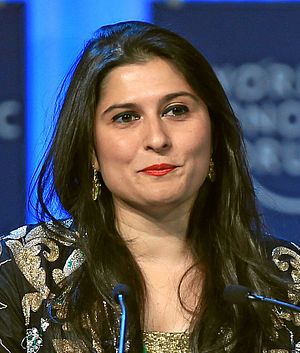On Sunday evening, Pakistani filmmaker Sharmeen Obaid-Chinoy took the stage at the 88th Academy Awards and accepted her second Oscar. Chinoy’s short documentary film, A Girl in the River: The Price of Forgiveness, tells the story of an 18-year-old Pakistani girl named Saba Qaiser whose father shot her in the head for eloping, put her body in a sack and dumped her in the river. She survived, but many other women do not survive so-called honor killings. In 2012, Chinoy became the first Pakistani to win an Oscar when she was honored for her film Saving Face, which chronicled the struggle of acid-attack victims for justice.
In accepting the award, Chinoy said “this is what happens when determined women get together.” She went on to thank “all the brave men out there, like my father and my husband, who push women to go to school and work and who want a more just society for women.”
The film has sparked a national-level conversation in Pakistan. After the film was nominated, Prime Minister Nawaz Sharif met with Chinoy to congratulate her and talk about the circumstances that led to the film, namely the legal loopholes that permit men to murder women in order to reclaim their family’s “honor.” If a woman–or her relatives–pardon the killers they escape justice for the crime. Saba was pressured by the community to forgive her would-be murderers. Sharif promised to “rid Pakistan of this evil by bringing in appropriate legislation.”
“That is the power of film,” Chinoy said on stage.
While legal and social changes may be slowing in coming, the moment is certainly ripe for a leap forward. The prestige of the Academy Awards shines a spotlight on the issue, though not all in Pakistan are necessarily pleased by the light’s glare.
In an interview with Shaimaa Khalil from the BBC ahead of the awards, Chinoy said some in Pakistan criticized her for the film. “She says she received criticism from people who say she only highlights the worst aspects of the country.”
This is a critique that has been lobbied at many documentarians (and journalists for similar reasons) around the world. Bringing taboo subjects to an international stage can be perceived by some as embarrassing the country. But Chinoy’s motivation is not embarrassment, but change.
In another interview, by email with Bashir Ahmad Gwakh of RFE/RL, Chinoy said it was professionally an honor to be recognized with the nomination:
“But for me personally, it will be an even bigger win if we, as a nation, take this opportunity to acknowledge that we have a problem and pass the Anti-Honor Killings Laws (Criminal Laws Amendment) Bill 2014. It is time we change the law and stand up for the victims of this heinous crime.”
The Punjab provincial government passed a law on February 25 broadening the definition of “violence” against women, a move welcomed by regional activists. But laws have been passed before attempting to address the issue of honor killing and violence against women, with little discernible effect.
Nonetheless, Chinoy’s impact on national and international conversations regarding issues of violence against women in Pakistan grows with time and the hope is that continuing to discuss these issues will engender progress.

































